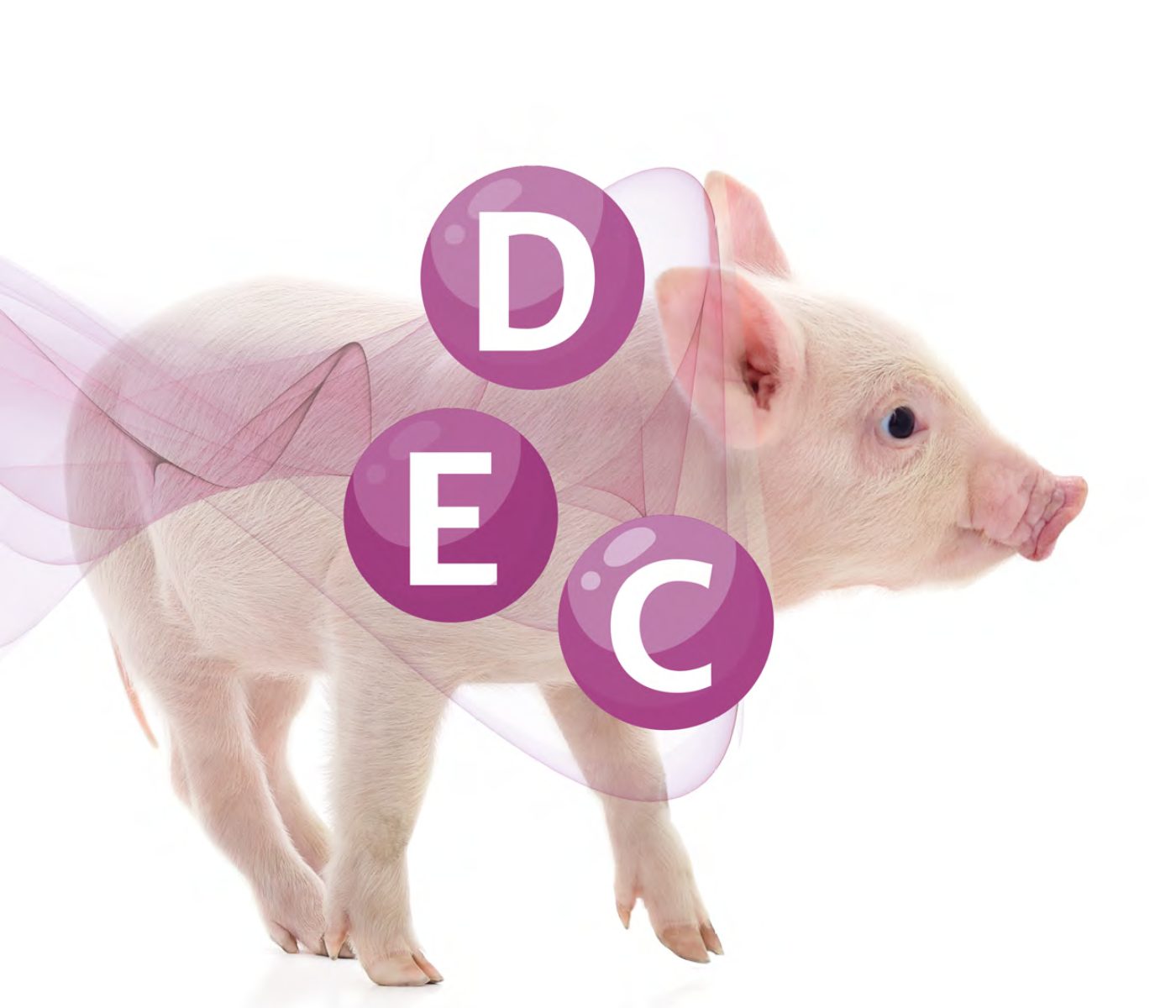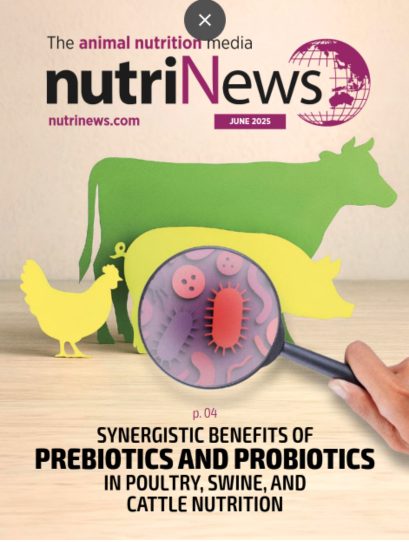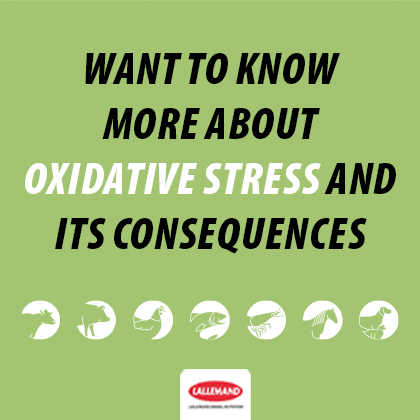Review | Effects of vitamins D, E, and C supplementation on pig’s health under different challenge models
Introduction
Pig production frequently face significant challenges (e.g. infectious diseases, environmental stressors, and management practices) that negatively affect pigs health and productivity, causing exacerbated immune reactivations and oxidative stress (Le Floc’h et al., 2021).
Oxidative stress caused by zearalenone-contaminated feed (Su et al., 2018), lipid peroxidation (Silva-Guillen et al., 2020), heat stress (Feng et al., 2017), rotavirus (Tian et al., 2016), and porcine epidemic diarrhea virus (Yang et al., 2019) can be used as challenge models that simulate stressors at the farm level. These challenge models aim to understand their effects on the physiological and immunological responses of pigs, and help to develop mitigation strategies such as vitamin supplementation in diets.
Vitamins D, E, and C play vital roles in supporting pig health through their contributions to immune response, antioxidant defense, and metabolic processes (Hao et al., 2021; Mainardi et al., 2024). Although isolated studies have addressed the effects of these vitamins under normal and challenging conditions, there are still significant gaps regarding their specific requirements and mechanisms of action.
Maintaining optimal dietary levels of these vitamins is essential, particularly when pigs face various stressors that require additional nutritional support. Research shows that increasing dietary levels of these vitamins beyond current recommendations can boost immune responses and reduce oxidative stress, enhancing intestinal health and mitigating adverse effects of stressors (Liu et al., 2016; Feng et al., 2017).
Thus, this review aimed to summarize information on the roles of vitamins D, E, and C in immune regulation and antioxidant capacity, emphasizing their importance in supporting the intestinal health of pigs in challenging conditions such as infections, oxidative stress, and heat stress.
Impacts of Dietary Supplementation with Vitamins D, E, and C on Immune Function, Antioxidant Capacity, and Intestinal Health in Challenged Pigs
Vitamin D
Vitamin D regulates mineral homeostasis (Ca, P, Mg) and bone function, and influences innate and adaptive immune responses (Wu et al., 2019; Calder et al., 2020), for example:
- Supports intestinal barrier function by upregulating tight and adherens junctions proteins, increasing transepithelial resistance in intestinal epithelial cells, thus enhancing barrier integrity (Yang and Ma, 2021).
- It stimulates antimicrobial peptide production, enhancing immune defense (Wang et al., 2004).
- It promotes monocyte proliferation and differentiation into macrophages, enhancing chemotactic and phagocytic functions (Wu et al., 2019).
- It reduces pro-inflammatory cytokine expression by inhibiting p38 activation (Zhang et al., 2012).
- It inhibits dendritic cell differentiation and maturation (Gombart et al., 2020).
- Influences adaptive immunity by inhibiting T and B cell proliferation and modulating CD4+ T cell differentiation, promoting anti-inflammatory Treg cells and suppressing pro-inflammatory Th1 and Th17 cells (Wu et al., 2019; Pecora et al., 2020).
Studies (see Table 1) using porcine rotavirus models have shown that dietary vitamin D3 (5000 IU/kg) reduces the diarrhea prevalence and maintains weight gain and feed intake in infected pigs (Zhao et al., 2014; Tian et al., 2016). Liao et al. (2011) showed that supplementing weaned pigs with 2200 IU of 25-OH-D3/kg increased anti-inflammatory and reduced proinflammatory cytokines, while lowering serum IgA and IgM levels in pigs challenged with rotavirus.
- It regulates endothelial function and enhances antioxidant by increasing superoxide dismutase activity (Kim et al., 2020). Dietary supplementation with 2000 IU of 25-hydroxyvitamin D3 improved antioxidant capacity in weaned piglets (Zhou et al., 2022).
Vitamin E
Vitamin E, encompassing tocopherols and tocotrienols, plays essential roles in immunity and antioxidant defense (Wu et al., 2019), as shown in Table 2.
- It enhances T cell activation and promotes immune synapse formation between antigen-presenting cells and CD4+ T cells (Lewis et al., 2019).
- It reduces prostaglandin E2 production, probably by inhibiting cyclooxygenase activity, thereby supporting T-cell proliferation (Wu et al., 2019).
- As a lipid-soluble antioxidant, vitamin E scavenges reactive oxygen species (ROS), protects cell membranes, and preserves immune cell function (Calder, 2013).
- It prevents lipid peroxidation in membranes and participates in “vitamin E recycling”, improving antioxidant defenses (Traber and Stevens, 2011).
Table 1. Summary of studies about the use of vitamin D (Vit D) in pig diets under challenging conditions.
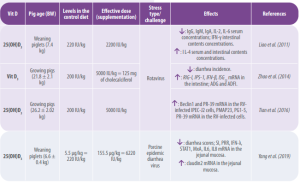
BW: Body weight; IgG, IgM, IgA: Immunoglobulin G, M, A; IL-2, IL-6, IL-4, IL-8: Interleukin 2, 6, 4, 8; IFN: Interferon; RIG-I: Retinoic acid-inducible gene I; IPS-1: interferon-b promoter stimulator 1; ISG15: Interferon-stimulated gene 15; ADG: Average daily gain; ADFI: Average daily feed intake; Beclin 1: protein involved in the regulation of autophagy; PR-39: proline-arginine rich 39-amino-acid peptide (an antimicrobial peptide); PMAP23: Porcine myeloid antimicrobial peptide 23; PG1-5: cysteine-rich PG1 (PG-1) to PG-5; RV: Rotavirus; SI: Sucrase-isomaltase; PRR: Pattern recognition receptors; STAT1: signal transducers and activators of transcription; MxA: Myxovirus resistance A.
Table 2. Summary of studies about the use of vitamin E (Vit E) in pig diets under challenging conditions
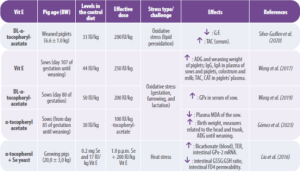
BW: Body weight; G:F: Gain-to-feed ratio; ADG: Average daily gain; IgG, IgA: Immunoglobulin G, A; IL-10: Interleukin 10; TAC: Total antioxidant capacity; CAT: Catalase; GPx: Glutathione peroxidase; TER: Transepithelial resistance; MDA: Malondialdehyde; GSSG: Oxidized glutathione; GSH: Glutathione; FD4: fluorescein isothiocyanate–dextran.
The addition of peroxidized oil to pigs’ diets induces oxidative stress, negatively affecting growth performance. Vitamin E supplementation (200 IU of DL-α-tocopheryl acetate/kg diet) improved total antioxidant capacity (TAC) in weaned pigs, but did not enhance TAC in those fed peroxidized oil, indicating effective antioxidant activity against oxidation (Silva-Guillen et al., 2020).
Oxidative stress can impair sow performance and piglet development (Gómez et al., 2023). Wang et al. (2017) found that 250 IU/kg of vitamin E from day 107 of gestation improved the piglets’ average daily gain, weaning weight, immune function, and antioxidant status.
Gómez et al. (2023) reported that 100 mg/kg of vitamin E from day 85 of gestation enhanced birth weight and early growth, highlighting the importance of maternal oxidative status in supporting piglet development.
Vitamin C
Vitamin C supports skin integrity by stabilizing collagen, enhancing collagen gene expression, and aiding tissue remodeling (Carr and Maggini, 2017; Pecora et al., 2020). This is relevant for group-housed sows, where restricted feeding can lead to aggressive behaviors and increased skin and hoof lesions (Bench et al., 2013).
- As a cofactor for hydroxylases, vitamin C limits neutrophil survival and NET formation, reducing tissue damage (Carr and Maggini, 2017).
- It increases T and B cell differentiation, proliferation, and antibody production while regulating T-cell maturation (Pecora et al., 2020).
- It boosts NK cell cytotoxicity and acts as a potent immunostimulant (Pecora et al., 2020).
- It regenerates crucial cellular and membrane antioxidants, including vitamin E and GSH, to their active state (Shi et al., 2017; Gombart et al., 2020). However, vitamin C can also be regenerated at the expense of GSH (Lauridsen et al., 2021).
- It helps maintain the redox balance by scavenging ROS, protecting biomolecules from oxidative damage (Hao et al., 2021).
Vitamin C supplementation (150 mg/kg) mitigates zearalenone-induced oxidative stress, restoring serum concentrations of estradiol, progesterone, luteinizing hormone, and follicle-stimulating hormone in weaning piglets, and reducing vulva size (Shi et al., 2017; Su et al., 2018). It acts by modulating nuclear receptors and inducing enzymes involved in xenobiotic metabolism, thereby facilitating zearalenone detoxification (Hines and McCarver, 2002).
| In soybean allergy models, oral vitamin C (1.0 g/day) increased interferon-γ synthesis, suppressing IL-4 and serum IgE (Sun et al., 2009). Additionally (see Table 3), vitamin C supplementation (500 mg/kg vitamin C + 500 mg/kg N-carbamylglutamate) in sows diet improved piglet birth and weaning weights and reduced oxidative stress markers during heat stress (Feng et al., 2017). |
Table 3. Summary of studies about the application of vitamin C (Vit C) in pig diets under challenging conditions.
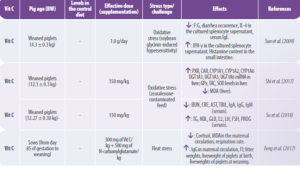
BW: Body weight; F:G: Feed-to-gain ratio; FI: Feed intake; IgG, IgM, IgA, IgE: Immunoglobulin G, M, A, E; IL-4: Interleukin 4; IFN: Interferon; PXR: Progesterone receptor; CAR: Constitutive androstane receptor; CYP: Cytochrome P450, phase I metabolic enzyme genes (1A1, 1A2, 1A6); UGT: Uridine diphosphate glucuronosyltransferase, phase II metabolic enzyme genes (1A1; 1A3; 1A6); GPx: Glutathione peroxidase; TAC: Total antioxidant capacity; SOD: Superoxide dismutase; MDA: Malondialdehyde; BUN: Blood urea nitrogen; CRE: Creatinine; AST: Aspartate aminotransferase; TBIL: Total bilirubin; TG: Triglycerides; HDL: High-density lipoprotein; GLB: Globulin; E2: Estradiol; LH: Luteinizing hormone; FSH: Follicle stimulating hormone; PROG: Progesterone
Dose requirements of vitamins (D, E, and C) for pig under challenging conditions
The recommended and practical levels of these vitamins for pigs and sows are shown in Tables 4 and 5, respectively. NRC (2012) recommends 150–220 IU/kg of vitamin D3 for pigs and 800 IU/kg for gestating and lactating sows. However, commercial diets often exceed these recommendations by over ten times (Dalto and Silva, 2020; Yang et al., 2021; Faccin et al., 2023). The Brazilian Tables (Rostagno et al., 2024) provide recommendations of 1108 to 2468 IU/kg for pigs, and 1660 IU/kg for gestating and lactating sows.
Studies with nursery and grower pigs (Liao et al., 2011; Zhao et al., 2014; Tian et al., 2016; Yang et al., 2019) following NRC’s 220 IU/kg baseline showed that higher vitamin D3 levels (2200–6220 IU/kg) in immunologically challenged pigs improved performance, fecal scores, immune status, and antioxidant responses.
Table 4. Recommended and practical levels of vitamins (D, E,and C) in nursery, growing, and finishing diets for pigs.
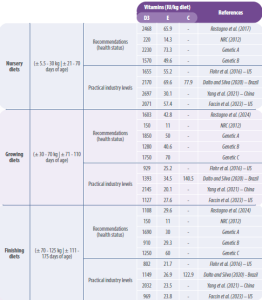
Table 5. Recommended and practical levels of vitamins (D, E, and C) in gestation, and lactation diets for sows.
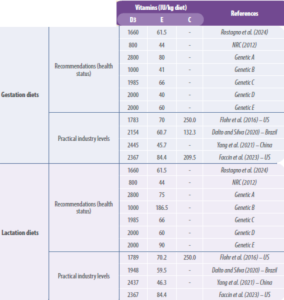
| NRC (2012) recommends 11–14.3 IU/kg of vitamin E for pigs and 44 IU/kg for gestating and lactating sows. In contrast, Rostagno et al. (2024) suggest higher levels:
🔎 65.9 IU/kg for nursery pigs, 🔎42.8 IU/kg for growing pigs, 🔎29.6 IU/kg for finishing pigs, and 🔎61.5 IU/kg for sows during gestation and lactation. |
NRC (2012) and Rostagno et al. (2024) do not estimate and there is no recommendation for vitamin C requirements for pigs
However, the beneficial effects of dietary supplementation with vitamin E at 200 IU/kg, have been evidenced in the immune response, intestinal health, and antioxidant potential of weaned and growing pigs challenged with heat stress and oxidative stress (Liu et al., 2016; Silva-Guillen et al., 2020).
Additionally, 200–250 IU/kg of vitamin E during late gestation and lactation improves the sows’ health and the performance and immune status of their offspring (Wang et al., 2017; Wang et al., 2019).
Conclusions and future expectations
- Vitamins D, E and C supplementation in pig diets above current recommendations has demonstrated the capacity to enhance immune responses and alleviate oxidative stress damage, improving overall health and performance.
- Further investigation into the supplementation of these vitamins at supra nutritional levels under specific challenging conditions reflecting commercial production systems may provide valuable insights for the formulation of more effective and precise diets for pigs.
